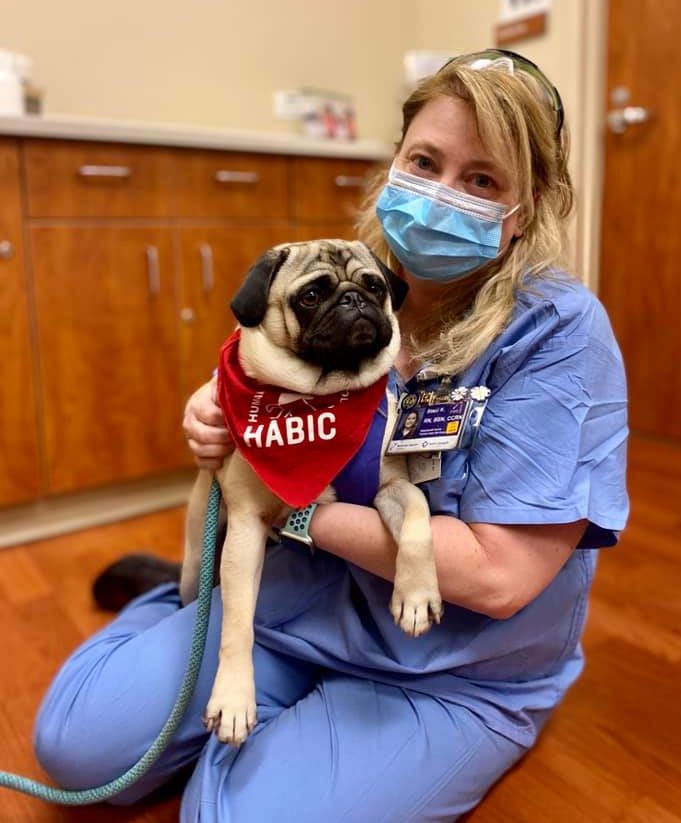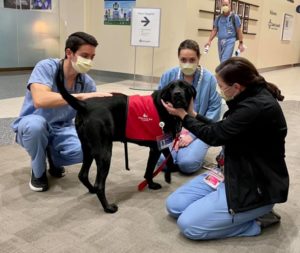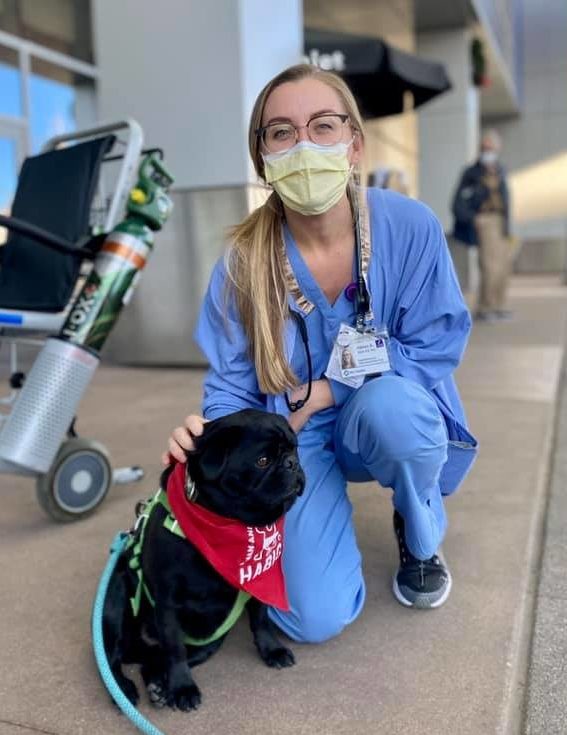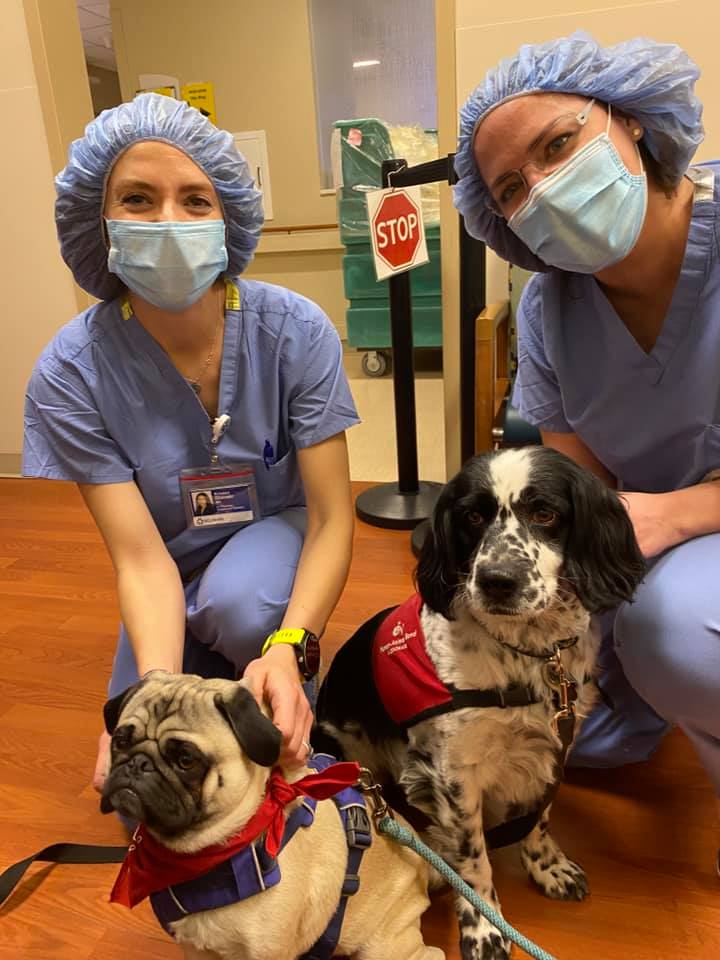 Every week, when Human-Animal Bond in Colorado (HABIC) therapy dog program volunteer Lanie Maes and her two Pug dogs, Doc and Fitz, visit St. Joseph Hospital in Denver, she can see gratitude and relief among the doctors and nurses.
Every week, when Human-Animal Bond in Colorado (HABIC) therapy dog program volunteer Lanie Maes and her two Pug dogs, Doc and Fitz, visit St. Joseph Hospital in Denver, she can see gratitude and relief among the doctors and nurses.
She can see it in their eyes.
“They come in groups of two or three, and really need to de-stress,” said Maes. “They sit on the floor and they hold the dogs. You can’t see a smile behind a mask, but you can see their eyes dancing and you can see their shoulders relax.”
In October, the HABIC program restarted to serve the mental health needs of healthcare personnel at St. Joseph’s Hospital on Wednesdays and Saturdays. The human-animal volunteer teams visit in designated areas on the main floor and near the intensive care unit.
Patient and family visits, the foundation of the HABIC program at St. Joseph’s for years prior to Covid-19, remain on hold due to pandemic restrictions.
“With the pandemic, I had not seen them for nine months,” said critical care nurse Staci Krieger, “and they still recognized me. Truly one of the best days I had at work in nine months was when our furry friends were able to come visit us in the waiting room on the unit!”
HABIC therapy dog program addressing mental health needs of healthcare personnel
 The Covid-19 pandemic has taken a mental and emotional toll on healthcare workers. Recent international studies report high rates of depression, anxiety, insomnia, and PTSD.
The Covid-19 pandemic has taken a mental and emotional toll on healthcare workers. Recent international studies report high rates of depression, anxiety, insomnia, and PTSD.
A global survey from KPMG found 59% of healthcare workers said their mental health had worsened due to the pandemic.
Prior to the pandemic, HABIC teams at St. Joseph’s had primarily visited patient rooms and family waiting rooms. “When we came back and they asked if we can come up to ICU that tells me something,” said Maes.
“When you’re invited like that you know they need you,” Maes said. “They really need to have time to be able to come and pet a dog and have the dogs respond to them. These two dogs get it. I can tell they feel something. They know when they need to get closer to that ICU nurse.”
Shifting focus of care from patients to healthcare workers
 Healthcare workers at St. Joseph’s understood the effectiveness of animal-assisted interactions because of the dedication of HABIC volunteer teams over the years in working with patients.
Healthcare workers at St. Joseph’s understood the effectiveness of animal-assisted interactions because of the dedication of HABIC volunteer teams over the years in working with patients.
“I have worked at St Joe’s in critical care for nearly 23 years,” said Krieger. “I have witnessed patients in the ICU who are critically ill and severely depressed from dealing with their critical illness, and who have been withdrawn to most interactions with hospital staff, just light up and interact with the therapy dogs.”
Yet transitioning from serving patients to serving healthcare personnel has been an extensive process for HABIC center administrators. The pandemic had imposed downtime on all volunteers.
“Because teams have now been out for nearly a year, we are following a thorough re-onboarding process for returning to in-person visits, to be sure we are ready to welcome back HABIC teams,” said HABIC director Helen Holmquist-Johnson.
“We had multiple communications with hospital administrators after St. Joe’s decided they were ready,” Holmquist-Johnson said. “The volunteers then needed to follow new protocols, which includes new Covid-related training videos, medical forms, and updates.”
 HABIC volunteer Kathleen Huggins and her dog Jimmy are another of the four current volunteer teams who have accepted the opportunity and challenge of serving healthcare personnel; but she misses seeing the patients at St. Joseph’s.
HABIC volunteer Kathleen Huggins and her dog Jimmy are another of the four current volunteer teams who have accepted the opportunity and challenge of serving healthcare personnel; but she misses seeing the patients at St. Joseph’s.
“I am missing walking around the hospital, and running into and visiting so many people, as opposed to the smaller number that we can see now,” said Huggins.
There is no question, however, that the human-animal teams in the HABIC therapy dog program are still appreciated and making a difference. “Being able to spend a few minutes out of a busy ICU shift interacting with furry friends,” said Krieger, “just warms your heart and lightens your soul.”
About Human-Animal Bond in Colorado
Founded in 1993, Human-Animal Bond in Colorado (HABIC) is a center in the School of Social Work, part of CSU’s College of Health and Human Sciences. HABIC’S mission is to improve the quality of life for people of all ages through the therapeutic benefits of companion animals, with particular focus in the areas of community outreach, teaching, and research.
